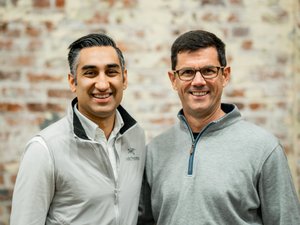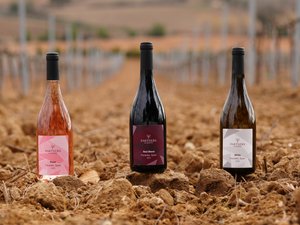
As Charlotte Inno has chronicled in recent weeks, the coronavirus pandemic has left many early-stage startups at an existential crossroads, facing the pressure to adapt immediately or fold. Local entrepreneurs are adjusting their products and services accordingly to pivot in an ever-changing market.
Druid, a year-old agtech startup based in Charlotte, is accepting the challenge. The company, which markets an AI-based indoor farming platform, is temporarily pivoting to 3D-printed reusable masks and consumer garden supplies.
The reusable masks come in three styles, starting at $16.99, with cloth filters that the wearer can replace after use. Druid is also allowing customers to donate masks to medical professionals.
“We started printing masks a few weeks after the start of the pandemic when it was reported that hospitals, nursing homes and other medical facilities were running low on PPE and were resorting to anything they could get their hands on,” said Julian Walker, the founder and CEO of Druid. “Seeing our medical workers under-equipped for the crisis really motivated us do something.”

Druid is also selling 3D-printed planters to meet the demand for a growing trend of people starting “pandemic gardens” to cope with stress and establish a resilient food source as supply shortages mount.
Walker pitched Druid’s pivot at last week’s Virtual PitchBreakfast event, which you can watch here.
The Covid-19 pandemic entered as Druid set plans to begin construction on a pilot test farm and move into a research facility, but Walker said those plans are now delayed indefinitely. The masks and planters serve to support the startup with stable revenue as it continues developing its indoor farming system and the technology that powers it.
Druid’s AI-based platform monitors and controls hydroponic farming systems to optimize crop growth in a variety of environments, from small homesteads to mega-farms. Walker said that the system is trained with decades of agricultural data and can be installed in both greenhouse and warehouse-style farming systems. It can also grow up to 144 heads of lettuce at a time.
The hydroponic (soilless) approach to farming has been a focus of Walker’s for years. In 2017, he started his first venture, Queen City Farms, and developed a hydroponic system that could be mounted onto a wall.
Walker installed a pilot “farm wall” at Camp North End last June. The hydroponic growing system is comprised of multiple vertical towers, producing basil, arugula and other leafy greens and herbs.
Last year, Walker started Druid to work on building machine learning technology behind the hydroponic farming system, alongside co-founders Cameron Howard and Desmond Irby.

The hydroponic model of agriculture is faster and more efficient than traditional methods, requiring much less water to grow crops. This makes it advantageous to addressing food insecurity, particularly in cities that rely on a resilient supply chain—especially in a pandemic
Walker said the Covid-19 crisis has shown why indoor farming is needed in cities.
“Food supply chains are starting to break down and large industrial farms have been forced to discard millions of pounds of food that they can’t sell," he said. "Many cities rely on food imported from elsewhere and that approach is now backfiring tremendously. If cities instead decide to promote and support local food producers and farmers, it would not only provide a stable food supply but also jobs, education and health awareness to these communities.”
The coronavirus pandemic has exacerbated the existing food security gaps across the country, including in Charlotte. Before Covid-19, around 126,200 people in Mecklenburg County were food insecure in 2018, according to data from Feeding America. This amounts to a food insecurity rate of 12 percent for the overall population or 15.3 percent among children. The average meal cost for Mecklenburg County residents was $3.36 in 2018.
As the economic fallout of the coronavirus pandemic continues, Mecklenburg County is currently experiencing its highest unemployment rate in over a decade, rising to 12.8 percent in April with 74,000 people jobless. In comparison, the unemployment rate in April of last year was 3.4 percent.
“As a side effect of Covid, food insecurity has become a reality for many Charlotteans and the rest of the country,” Walker said. “Lines at food banks and soup kitchens have almost doubled, as thousands have become unemployed and unable to feed their families. Many food banks are unable to keep up with the demand and are forced to turn people away.”
In the backdrop of Covid-19, addressing the food insecurity crisis is the overarching mission of Druid as it aims to expand indoor farming adoption in Charlotte, across North Carolina and nationwide.
Walker said going forward, Druid will begin offering consulting services for businesses, investors, nonprofits and governments interested in running indoor farms in their communities. The consulting services include farm design, feasibility studies, research and analysis, and farm system planning, in combination with Druid’s AI platform to bring data and insights to clients in the collective farm network.
“We feel this approach will help accelerate the adoption of indoor farming across the country,” Walker added. “We still plan on building our own farms, but we’re more than ready to help other organizations strategize on how to best serve their people.”








